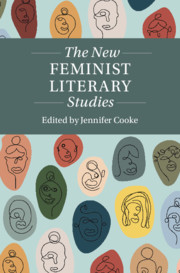Book contents
- The New Feminist Literary Studies
- Twenty-First-Century Critical Revisions
- The New Feminist Literary Studies
- Copyright page
- Contents
- Illustrations
- Contributors
- Introduction
- I Frontiers
- II Fields
- Chapter 7 Feminism and Literary Disability Studies
- Chapter 8 Feminism’s Critique of the Anthropocene
- Chapter 9 Queer Feminism
- Chapter 10 Social Reproduction: New Questions for the Gender, Affect, and Substance of Value
- III Forms
- Bibliography
- Index
Chapter 7 - Feminism and Literary Disability Studies
from II - Fields
Published online by Cambridge University Press: 16 November 2020
- The New Feminist Literary Studies
- Twenty-First-Century Critical Revisions
- The New Feminist Literary Studies
- Copyright page
- Contents
- Illustrations
- Contributors
- Introduction
- I Frontiers
- II Fields
- Chapter 7 Feminism and Literary Disability Studies
- Chapter 8 Feminism’s Critique of the Anthropocene
- Chapter 9 Queer Feminism
- Chapter 10 Social Reproduction: New Questions for the Gender, Affect, and Substance of Value
- III Forms
- Bibliography
- Index
Summary
Despite both its rhetoric and its intentions, activism is often ableist. A contemporary project to crip feminism is fundamentally epistemological and requires re-evaluating the state of embodiment, forms of social justice, and choices towards which we understand ourselves to be moving. Disability scholars seem increasingly interested in studying not just what we read (a matter of representation) but how we read and how narrative is formulated (a matter of knowing). Many recent imaginative works by women take up illness and disability not as classic metaphors for limitation and disenfranchisementor even just to create realistic portrayalsbut as specifically and emphatically phenomenological modes of engaging the world. With readings of Chicana feminist fiction (Ana Castillo), graphic memoir (Alison Bechdel) and black speculative fiction (Octavia Butler), I argue that the body under duress becomes a source of rewriting the terms under which identities and social relationships are defined. In this sense they speak and write directly into a moment in which it is the capacity to think courageously, and expansively, about what things 1mean that we must rigorously safeguard.
Keywords
- Type
- Chapter
- Information
- The New Feminist Literary Studies , pp. 99 - 112Publisher: Cambridge University PressPrint publication year: 2020



